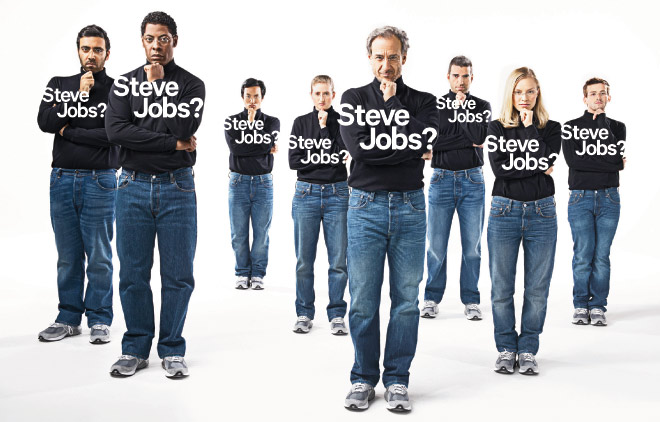Steve Jobs as Rorschach test

In 1997, shortly after returning to Apple as CEO, Steve Jobs decided that the transport company was not delivering components to them quickly enough. The carrier, in response, stated that it could not deliver faster and should not: the deadlines set out in the contract were respected. Jobs ordered to break the contract. And he added that if they try to sue, they will never get a cent again.
The transport company sued. The manager who worked with her quit. The trial cost a large amount of money, but the goal was achieved: Apple found a new, more agile carrier.
Biographies of successful people are used as sources of inspiration and instructions for action. What lesson can be learned from this story? That the end justifies any means. Jobs did not hesitate to call his subordinates idiots, and say that they are doing wrong. No one was protected from his attacks, not even the high ranks of Apple. Jonathan Ive, the company's chief designer, once took a room for a five-star hotel in London for Jobs. Jobs flew out with a bullet wailing "What kind of shit!" Random people who fell victim to his anger (police, shop and restaurant workers) received the same "courteous" treatment.
')
Almost a year has passed since Jobs died, but his biography by Walter Isaacson is still a bestseller. For entrepreneurs, Jobs’s life is like the Gospel and the anti-Gospel in one person. Some see him as a vivid example of how important it is to follow your vision and your goal. Others - an instructive story about how you can change the world, but turn everyone around against you. Such a range of opinions speaks of the existence within us of two strong, but contradictory needs: to succeed in work and at the same time have a happy personal life. What is it really like to be Steve Jobs?
There are a lot of people like Steve among the businessman: aggressive, with dictatorial manners, tuned to constant competition, who perceive work as the most important thing in life. Jobs' biography only reinforced them in the thought that they were doing everything right. Here are some examples.
Steve Davis, the head of TwoFour , eagerly responded to my suggestion to tell what effect Jobs had on his life and career. When Davis found half an hour to talk to me (with his busy schedule, this turned out to be a problem), he immediately admitted that he had to some extent sacrificed his family life for the sake of work. Fortunately, his wife did not mind.
Talking about business, Davis is excited. He loves risk and uncertainty, he enjoys every minute of his work. During the interview, a lawyer called and Steve admitted that he did not know what to answer. “Entrepreneurs are different from ordinary people,” says Davis. - We are not afraid of trouble. Look at Jobs. There were enough failures in his life, but he kept going forward. Jobs is unconventional, he follows his own path. You can either join him or get out of the way. ”
Join or get out of the way - this is the main thing that those who consider Jobs as a role model have learned. “Jobs has shown how effective an authoritarian management style can be. He refuted the thesis of modern sociology that happy employees are always more effective. ”
Tristan O'Tierney, co-founder of Square , confirms the benefits of aggression: “Do not be afraid to tell people directly: your work is crap. Great things are created only thanks to frankness and uncompromising ".
Aaron Levy, the creator of the Box service, adds: “The Jobs story taught me that you can demand the impossible from your employees. They should know that I will not allow the product to be released until it is polished to a shine. This is good for a product, but not for people. "
However, the team is easily reconciled with a rude and authoritarian management style, if the organization shows impressive results. Jobs regularly called subordinates semi-fools, but very few people fired because of this. Moreover, the employees considered themselves the happiest people, because they happened to work with Steve Jobs himself.
Bridgewater Associates , the most profitable hedge fund in the world, is another example of the effectiveness of authoritarianism and brutal frankness. Its directors Ray Dalio are called "Steve Jobs in the world of investment." He cultivates in the company a tough manner of communication, without looking at the feelings. “It hurts at first,” says Dalio. “But the pain passes quickly, and you begin to have fun.”
Most of all Jobs fans liked the clarity of vision in him. Neil Sayles-Griffin, the founder and CEO of Code Academy , admits that thanks to Jobs, he stopped paying attention to the subtleties of etiquette. He mercilessly closes unpromising projects, regardless of how much time the employees have invested in them. Neil recalls MobileMe's failure to launch and Jobs's reaction . For the team it was stress, but the problem was quickly resolved.
Jobs' opponents are terrified by his dictatorial behavior. In Isaacson’s book, there are many instances of Jobs’s unceremonious behavior. He was infuriated on the most insignificant reasons (they didn’t like the flowers in the hotel or the drink in the cafe), he parked in places for the disabled, refused to issue license plates for the car (because of which he changed the car every six months), didn’t recognize the eldest daughter.

Among Jobs' critics is Jeff Atwood, the creator of the Stack Exchange . “Starting a startup is like getting involved in a war,” he says. “To succeed, you need almost religious faith in the project and full commitment.” Atwood left the Stack Exchange and abandoned thoughts about a startup. Insight for him was the book Isaacson.
Atwood was shocked by the description of Jobs's personal life. One story brought him almost to tears: Jobs showed the sketches of the new Apple campus to his son, but did not show Erin's daughter, although she was going to become an architect. He paid less attention to her because Erin was quiet and introverted. She did not know how to deal with his father, especially when he began to let go of taunts. “Work does not have to subdue everything else. How can you choose between creating a damn iPad and raising children? Children are more important, ”Atwood says.
Verinder Sial - the former owner of a coffee shop chain, and now a consultant and teacher at a business school - is less categorical: “I have always admired Jobs, but Isaacson’s book made me look at it from a different angle. Why did Jobs always want to be right and blame the others? Why did he take other people's ideas? ”According to Verinder, Jobs was like dynamite. Dynamite clears the way, but destroys everything around it. “Bill Gates was an ass, but over time turned into a decent man. Jobs both was and remains an ass, "- says Sial.
Claims of Sial and especially Atwood are only partially justified. If you carefully read the book, then closer to the end you can find a fragment where Jobs explains why he asked Isaacson to write a biography: “I wanted my children to know me. I was not always with them and I want them to understand why this happened. ” Brad Wardell, the CEO of gaming company Stardock , was shocked when he realized that Jobs died prematurely for the same reason that he created the iPod, iPhone and iPad. His perception of reality was greatly distorted. He refused to believe in the seriousness of the disease and postponed treatment for nine months . “Jobs’s example gave me the strength to work 80–90 hours a week,” says Wardell. - But then I realized that he was also mortal. Jobs did not communicate well with his children. I made the same mistake. ” Now Brad is trying to work more often from home and delegate more.
Many Jobs fans closer to 40 years of age come to the conclusion that a small, calm lifestyle-type business (like 37signals) is preferable to a life-long affair that consumes you without a trace. Two products a year instead of six, thirty letters a day instead of two hundred, several hundred thousand or several million dollars of revenue per year instead of an IPO on NASDAQ.
Such an approach has the right to exist, but it is not necessary to raise the question so categorically: either work or private life. Successful women combine both. The need for motherhood forces them from a young age to build the right balance. Heidi Messer, co-founder of LinkShare , says: “Jobs did created two multi-billion corporations - Apple and Pixar. So, I can combine business and family. ”
Some time after the release of the book, Isaacson published an article in the Harvard Business Review. In it, he called for less to be fixed on Jobs' grumpy character and more on his outstanding achievements at Apple and Pixar. Isaacson summed up Jobs' views in 14 short commandments : “Distort reality”, “Achieve perfection”, “Keep around only people from the highest league”, etc. “His quarrelsome character will be forgotten,” Isaacson writes, “And achievements will forever remain in history. Along with Edison, Ford and Disney. "
Isaacson himself with attacks on Jobs usually does not agree: “Even in his worst moments, he was no worse than other powerful people of his level ... I personally know several readers who are outraged that Jobs was parked on the ground for people with disabilities. Do you know who these readers are? Investment bankers. The ones that came up with derivatives, which left millions of people without savings and led to a global crisis . ”
“When people criticize Jobs’s behavior towards his own family,” Isaacson continues, “I ask: how is it that you yourself have been married three times, and your daughter no longer speaks to you?” Jobs's personal life was not perfect, but in the end he created a strong family and raised four children who supported him to the very end. Why blame him? And, by the way, okay. Persuading critics is the same as arguing with fundamentalists about different versions of the gospel. ”
The example of Jobs clearly shows why we are so desperately looking for role models. Jobs never had a mentor. He always made decisions, relying on his own vision and intuition. We all face the same uncertainty, albeit on a smaller scale. That is why we turn to the biographies of great people — for answers and a roadmap.
The paradox is that Jobs's experience does not apply to most people . Few of us run Apple-scale companies and get a chance to change the world. Our employees, if you use them like Jobs, just go to another company. Our family will fall apart. Jobs acted on a completely different level, where much was forgiven. For the rest of this behavior will end badly.
Robert Sutton, author of The No Asshole Rule, notes Jobs as a highly effective tyrant. But in most cases, says Sutton, dictatorial manners create only problems. The creativity and productivity of employees is reduced, an indifferent attitude to work is formed, the level of absenteeism and staff turnover increases.
Sutton believes that Jobs was too special and too controversial to focus on him. This is the Rorschach test for entrepreneurs and managers: everyone sees in Jobs what he wants to see .
Source: Wired
Source: https://habr.com/ru/post/148522/
All Articles